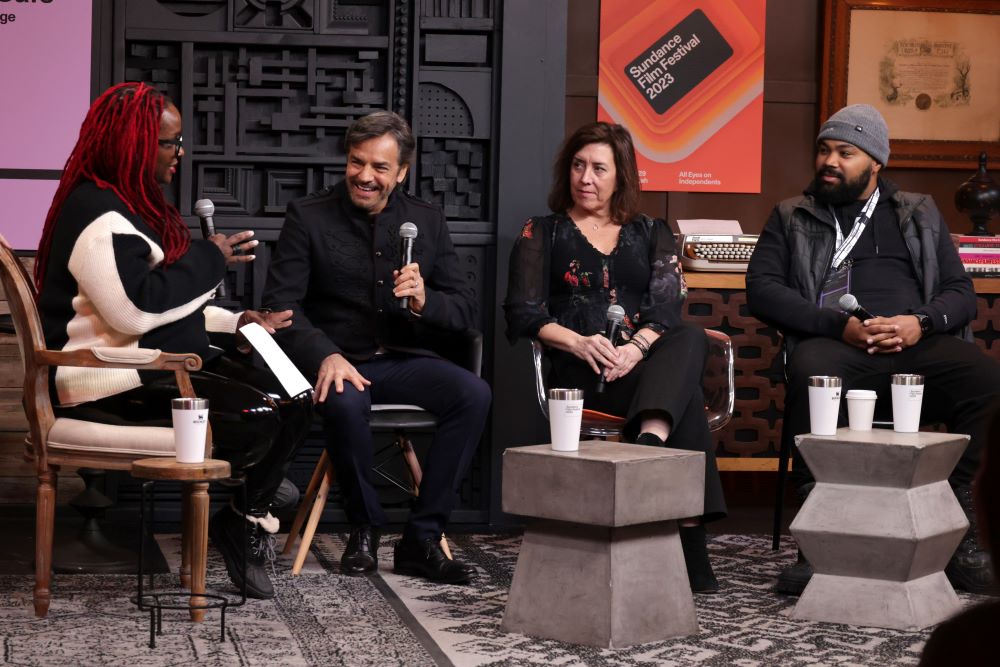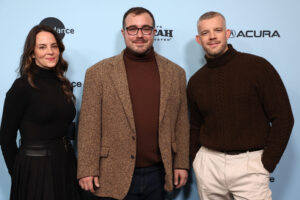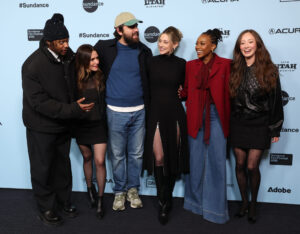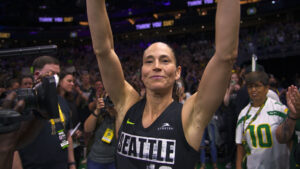Participating in a Cinema Café discussion at the 2023 Sundance Film Festival were (from left) Effie Brown, Eugenio Derbez, Diane Becker, and Tommy Oliver. Getty Images.
By Vanessa Zimmer
The theme was Controlling the Narrative at the Cinema Café on Saturday morning, but things were a bit out of control. The “talent” was 10 minutes late for arrival.
Sundance Film Festival programmer Ania Trzebiatowska apologized not-so-sheepishly for their tardiness, on account of “someone just got a standing ovation at the Egyptian [Theatre].” And the eager, packed audience gathered for the panel — offered as a part of the 2023 Festival — instantly forgave them.
The “talent” consisted of three producers of new or past Festival films: Eugenio Derbez (Radical), Diane Becker (Navalny), and Tommy Oliver (Young. Wild. Free.). Moderating was another noted producer, Effie Brown, also a Sundance alum (for multiple films, among them Rocket Science, Dear White People, and Real Women Have Curves).
Derbez was the aforementioned recipient of the Egyptian ovation. He is not only the producer of this year’s Radical, but also the lead actor in the tear-jerking story about a teacher in a Mexican elementary school who innovates a teaching technique that inspires his students.
“I am a producer out of necessity. I really needed to keep my own voice,” says Derbez. He started out as a comedian in Mexico, and has transitioned to acting, writing, and producing after realizing he was not entirely happy with some of the roles he was playing.
Among the takeaways from Saturday’s session were these tips from the three experienced producers on supporting independent storytelling:
Get out of the way. Let the director tell the story they want to tell. “My job is to understand the movie you want to make,” says Oliver. “I’m not the director.” Instead:
Learn how to “block and tackle.” Remove any obstacles to completion of the project, and pursue/tackle sufficient funding, explains Oliver.
Learn how to say “no.” In the effort and struggle to secure funding for an independent film as a producer, don’t compromise your project. Derbez worked 12 years to complete a single project. One company expressed an interest, but wanted to change the ending. That was something Derbez could not abide. He turned them down and secured funding six years later.
Still, know the difference between saying no and being stubborn, adds Derbez. “You should always listen.” Sometimes, executives have good suggestions.
Becker elaborates: Establish your line in the sand, and don’t deviate from that.
Work with good people who endeavor to tell good stories. Becker says she chooses to work with filmmakers possessing a distinctive voice and a passion for the film. Navalny, for example, appealed to her intuition as a journalist — “the good guy fighting the fight.” “For me, film is god, and it will tell us what to do,” she adds.
The integrity of those filmmakers is ultimately important, Oliver says: “I’m not interested in working with people “that I wouldn’t want to go to dinner with.”
Oliver couldn’t leave Saturday’s conversation without a parting compliment for the Festival. “Sundance is a special place,” he says. “Being here is like being at summer camp.”
And Brown couldn’t resist adding: “A very cold summer camp.”







